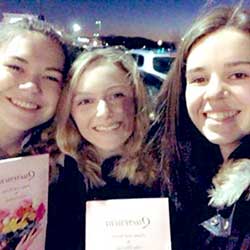 *
*
Somerville performance artist and writer JoJo Lazar chimes in with a review of a new book from the Ibbetson Street Press/Endicott College/Young Writers Series:
Review by Off the Shelf Correspondent Jo Jo Lazar
When Doug Holder asked me how I was enjoying Querencia by Allie Hastings, I told him immediately, “I was much more committed to being mysterious in my poetry as a teenager!” I’m complimenting her adept voice so early in her career, as the clarity and conservation of symbols doesn’t detract from the range of experiences and feelings in the work. I compare poems in this collection to the feeling I get reading Baudelaire (see An Umbrella for Two) and in the nature-centric pieces, some Mary Oliver.

Allie Hasting, center.
This is a fun, witty, generous collection, with scenes unfolding a petal at a time from a unique bouquet of life experiences and imagination. You walk London streets, beaches, take forest-strolls, and maybe get your heart stomped on a little at music stores, and coffee shops. These poems and stories are vibrant post cards from the heart of poetic moments, gifts still raw with “the thing itself” coupled with the balm of the narrator’s wisdom.
The weather was cool enough to see the air of our breath when either of us spoke; I left my jacket in your car because I had fooled myself into believing autumn wasn’t quite over yet–the sun was shining over our heads… The woods, at first glance, appeared a glorious fall wonderland, but very quickly upon our walk did I feel its brisk embrace tickle my shoulders, the shivers sending goosebumps to the surface of my fragile skin.
I almost asked you if we could turn around and go back so I could get my jacket out of your car.
But I didn’t want to be that girl.
— The Deceptive Nature of Love
In the margin I wrote “real minutiae of womanhood and dating,” I related with the hyper-awareness and hyper-analysis of these things. All the while the story is assonant, lyrical, layered like watercolor strokes in Jane Kenyon or Mary Oliver, and poignant because of too many thresholds of reality occurring all at once.
My first takeaway from this story was the autobiographical narrator-fallacy-magic feeling that surely I had read something true! based on writer’s felt experience. Hours later I realized it was another huge layer of liminality, perhaps the entire book Querencia’s meta-theme too is “thresh-hold overload.”
Too many changes or possibilities occurring to the mind at once, so we become a slower camera, absorb every detail. All this crept up on me hours after reading, and I am still admiring this story (prose-poem) as a favorite in the collection; what could have been an easy cliché/play-scene, (a forest walk, a break-up or not? conversation is about to unfold) is unpeeling in a slow-reveal hours later in one’s mind.
This lovely book boasts a wise and open “beginner’s mind” as one says in Buddhism. The work is self-aware and not embarrassed to tell us in the more straight-forward lyrical poems that the narrator/writer is eighteen, but feels much older. Yet there is honest impatience to have lived more already, the act of nostalgia is literally tried on in poems like Nostalgia.
There’s also a youthful sense of the number of times something has happened – tally feel, a mindset that any writer/journaler may not shake in a lifetime. The enclosed unit of only so many memories and references never detracts, I am still thinking about a girl’s raincoat and boots, and another’s forgotten jacket in the back of a car.
I was taken to many childhoods, on foreign adventures, and became empathic tourist to universal and unique scenes of heartbreak. I feel privileged indeed to remember what poetry can do, to remember how to report back from the very sparks (scenes/memories/dreams) that make one want to write at all.















Reader Comments